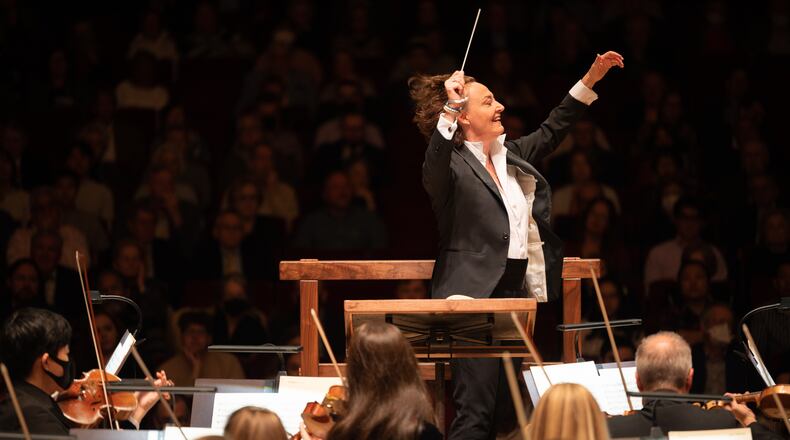As the choristers sang “lux perpetua luceat,” their commander, a tall, dark-haired woman dressed in black, signaled for them to stop and offered a gentle reprimand.
“You are talking about eternity and I have to feel it,” she said, in a distinctive Parisian accent. “You are talking about the light of God,” she said gesturing upward, “and I have to see that light.”
The singers, students at Columbus State College’s Schwob School of Music, knew the notes and the Latin words to Mozart’s “Requiem.” But on this day they were being asked, by superstar contralto and the Atlanta Symphony Orchestra’s new conductor Nathalie Stutzmann, to look at the essence: heaven, death, an angry God, forgiveness and peace. They opened their eyes wide. (They also opened their mouths, as instructed: “Open your mouths before the sound comes out,” said the maestro.)
“You are a little bit heavy and behind,” Stutzmann added at one point. “One more coffee please.” Then, at another moment, “Brava!” she told the soprano soloist. “Look how she does that without breathing,” she told the group. “Many sopranos, they breathe everywhere.”
At the end of the master class, all smiles, Stutzmann embraced the students and their regular choral instructor, and enthused, “there is nothing more beautiful than doing choral music in life.”
Credit: Atlanta Symphony
Credit: Atlanta Symphony
On any given day, Nathalie Stutzmann, 57, might be found in a major concert hall anywhere in the world. She will be conducting two productions by the Metropolitan Opera in May and June. She is principal guest conductor with the Philadelphia Orchestra, former chief conductor with the Kristiansand Symphony Orchestra in Norway. She debuted recently with the New York Philharmonic, the Munich Philharmonic and performed this season with the Helsinki Philharmonic and the London Symphony.
But on this February day she coached young musicians at the small Columbus school, which boasts only 256 students. After the choral workshop, she ran the school’s orchestra through a rehearsal of Brahms’ Fourth Symphony, and then offered criticism of a conducting student’s podium technique.
“It’s one of the things I love to do,” she said later from her home in Geneva, Switzerland. “Sometimes you can spend a few hours with these young people and for some of them you will open some doors.”
Stutzmann is approaching the end of her first season as music director of the Atlanta Symphony, only the second woman to lead a major U.S. orchestra, and though much of the 2022-2023 programming had been planned at the time of her appointment, she has already had an impact.
One example would be the arrival of renowned cellist Edgar Moreau as a substitute when the original artist contracted to perform the devilishly difficult Prokofiev cello concerto in February was unable to play.
Moreau is Stutzmann’s fellow countryman, with whom she has worked in the past, and their friendship helped make it happen. “I thought Edgar knocked it out of the park,” said ASO concertmaster David Coucheron. “I hope we get Edgar back. It’s wonderful to have a music director with those kinds of connections.”
Similarly, Stutzmann helped bring Gaetan Le Divelec, her former manager, over from London to serve as the ASO’s vice president of artistic planning. Le Divelec has substantive plans to reach out to audiences and artists absent from many classical music scenes, and Atlanta, he realized, was the right place to begin. “I wanted to work for an organization that takes seriously the challenge of embracing diversity and inclusion in classical music,” he said.
Stutzmann is also steering the orchestra back to the “core repertoire” of the classics and romantics. Under Robert Spano, the ASO was dedicated to commissioning and performing new music by living composers, nurturing what Spano called the “Atlanta School” of tonal, accessible, contemporary music.
Some elements of the classic repertoire, such as Mozart, were de-emphasized. Stutzmann said the classics should take precedence. “This orchestra needs to play Mozart, Beethoven, Brahms, Bruckner regularly, to keep in very good shape,” she said.
Credit: Atlanta Symphony
Credit: Atlanta Symphony
Audiences, which are gradually increasing in numbers — almost to pre-pandemic levels — have given Stutzmann a warm welcome. They brought her back for multiple ovations after the February series, concerts which included commanding renditions of Shostakovich’s Fifth Symphony.
The first audience to hear her in front of the ASO, after she was named music director in October 2021, wouldn’t let her leave the stage.
She happened to be serving as a guest conductor that night. “I’ve never seen a place light up like they did when they announced her,” said Buckhead resident Liz Weiler, an amateur musician and a regular at Symphony Hall. “You could see it in their faces, like they were a plant that had been given water. Their faces were alive.”
Backstage, after the Shostakovich in February, members of the orchestra sipped tiny glasses of Four Roses bourbon and goofed around on bassist Michael Kurth’s acoustic guitar, playing Elvis, Clapton and a little “Classical Gas.”
Morale appeared to be high. Kurth said members of the ASO Chorus are particularly excited about having a world-class vocalist as a leader of the organization. “They are nuts for her, they adore her,” he said.
Joia Johnson, a retired Hanes executive and a member of the chorus, performed in Beethoven’s Ninth Symphony last fall and looks forward to singing in Bach’s “St. Matthew Passion” this spring.
In rehearsal, when Stutzmann unleashes her rich, low register voice to demonstrate a phrase or a feeling, “it’s amazing,” said Johnson. “It’s almost as if the music moves through her, and you see that in her, and you want to replicate that as a musician. It’s just been a joy to experience that, and I know the musicians are experiencing it.”
Kurth feels the same way. “She sings with such a natural expressivity and fluidity that really I look forward to the moments when she sings.”
Said Stutzmann, “Everything about music is also about singing. Every instrument tries to play as a singer.” She added, “The fact that we have this amazing chorus in Atlanta was one of the big elements that attracted me.”
Stutzmann is the daughter of opera singers and grew up studying piano, bassoon, cello and viola. Though she attended conducting classes as a teenager, the podium was not open to young women in the 1980s. “It was completely impossible for a girl at that time,” she said. “The misogyny was very strong.”
Instead she pursued a career as a vocalist, then created her own ensemble, Orfeo 55, and recorded extensively in the Baroque literature, simultaneously singing and conducting. When her symphonic conducting career took off in the 20-teens, it took off quickly.
Today she is part of the change she wanted to see. In her latest foray into the all-boys club, she will conduct “Tannhäuser” at Bayreuth Festival, in the Bavarian opera house that Wagner built.
She was a student of the great Wagnerian bass-baritone, Hans Hotter, and “was in heaven when (she) got the invitation.” She is also proud that, in this instance, she’s not the first but the second female conductor to venture into Bayreuth. (She counts that as progress.)
In the meantime, she’s passing on the wisdom she’s accumulated to students such as those in Columbus, including 26-year-old freshman Enluis Montes Olivar, a Venezuelan prodigy and a protege of Gustavo Dudamel.
The gist of her advice to him: a little less coffee.
For the time being Stutzmann will probably continue to live in Geneva, where she has family. She reassures that wherever she is in the world, her travels are good for her and good for Atlanta as well.
“As the music director for your orchestra, there is not one day that I do not work for them,” she said. “It doesn’t matter if I’m in town or not. It is my duty as music director. This is very important, but it is also important to travel to other cities and other countries. You learn from other traditions, you learn from every city. Every personality of orchestra gives you much more colors and ideas.”
About the Author
Keep Reading
The Latest
Featured




